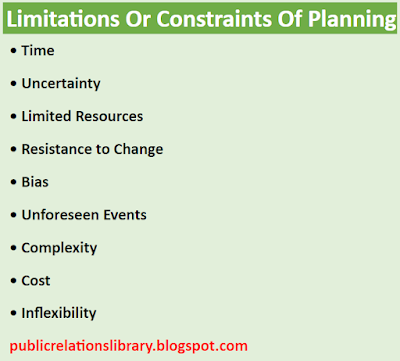Planning is the process
of defining objectives and determining the steps needed to achieve them. It
involves setting goals and determining the best way to achieve them. Planning
is an important part of management, as it helps organizations make the most effective
use of their resources.
Limitations Or
Constraints Of Planning

- Time: Planning requires a significant amount
of time to be effective. This can be a challenge for organizations with
tight schedules and limited resources.
- Uncertainty: The future is inherently
uncertain, and this makes planning difficult. This uncertainty can result
in incorrect assumptions and poor decisions.
- Limited Resources: Planning requires
resources such as information, data, and personnel. Organizations with
limited resources may struggle to effectively plan.
- Resistance to Change: Planning often involves
change, which can be met with resistance from employees and other
stakeholders.
- Bias: Personal biases and organizational
culture can impact planning processes and decisions.
- Unforeseen Events: Unforeseen events and
emergencies can disrupt plans, making it difficult to achieve objectives.
- Complexity: Planning can be complex and
involve many interrelated variables and decision points.
- Cost: Planning can be expensive, requiring
significant investments in technology, personnel, and other resources.
- Inflexibility: Plans can become inflexible,
making it difficult to adapt to changing circumstances and conditions.
In conclusion, while
planning is essential to the success of organizations, it also faces many
limitations and constraints. Organizations need to be aware of these
limitations and find ways to overcome them to ensure effective planning.